#is fueled by anger and fear and paranoia above all else?
Explore tagged Tumblr posts
Text
i’m holding xarrai in my hands like a baby bird. my weird angry little court jester. little fool who thirsts for blood and revenge. extremely normal little clown who desires only retribution.
#‘bard who thirsts for revenge’ is an extremely funny concept when i think about it too long#ur telling me the guy singing a dirty lil drinking song down at the blushing mermaid is also full of fury#and wants to dismantle an entire religion brick by brick?#that weird lil lady in the leather pants trying to convince a drunk patriar to pay way too much to take him to bed#is fueled by anger and fear and paranoia above all else?#oh okay yeah the tiefling who just told a funny lil story in the elfsong is a weapon of tyranny forged in blood and tears. cool!#extremely funny character. i like them.#i didn’t plan this. like it works out well bc who better to amass knowledge and sit right on the edge of power without anyone noticing than#a bard or a courtesan. the type of person powerful people wouldn’t think twice about because what kind of threat could they really be?#but. also if u take a step back they are just a clown who wants to kill.#okay i’ll stop blorbo posting about my own blorbo now. i am at work LOL#oc. xarrai
2 notes
·
View notes
Text
What Happens When Society Fails Those Who Could Succeed - A Bakugo Katsuki Analysis
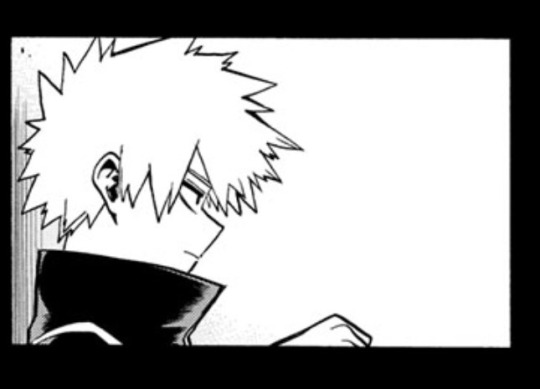
I started this a while ago, but I’ve seen others delve into this topic and I wanted to share as well. This delves into to hero society’s affects on Bakugo Katsuki’s upbringing, his worldview, his self-view, and Izuku’s involvement in breaking down the ideas society has drilled into his head.
A lot of people like to ignore the fact that Katsuki is a 14-year-old kid at the start of the series and that much of his life, attitude and disposition of the world have been completely shaped by the adults and society around him.
What do you expect a kid with potential to turn into when they are warped in such a way by a society that dictates that they need to be strong, or nothing at all? What about when your only value is based around a sliding scale of strength and weakness? What happens when that kid’s only source of help comes in the form of a reckless, selfless child who defies all sense of logic and reason (Izuku)?
Growing up, Bakugo was constantly praised for being strong, having a powerful quirk and being generally the smartest person in the room at any given time. He could arguably be considered a prodigy, and much of what he sees and learns feels beneath him -- because it's already on his mind. He is a kid with natural god-given talent that everyone around him immediately recognizes as above average.
Even as a toddler, he was constantly a step ahead of everyone else. Due to this, people developed a lot of high expectations for him at a young age -- and it doesn't help that he has a naturally competitive streak that makes him constantly want to prove himself and live up to these expectations; even surpass them.
Always being at the top of his class and being ahead of the curve mentally fuel the idea in Katsuki's mind that, in the game of life, he is 'winning'. Yet, at the same time, none of it is ever enough. Other's high expectations of him cause him to build extremely high expectations of himself; expectations that border on unrealistic. They also inflate his ego exponentially when this praise gets reaffirmed time and time again.
Certainly, in a situation where you're raised on other people's praise and validation, it is completely understandable that you would put a lot of emotional emphasis on other people's opinions of you. On top of that, he gives off such a natural and convincing air of confidence that people can't help but feel that he is reliable, despite his attitude. People are awed by him, and all of it feeds into the mental image he has constructed of himself, and the world as a whole. It's the whole reason for a lot of how he acts. He builds an image of himself based on the praise of those around him -- and even Izuku also feeds into this mentality by worshipping the literal ground Katsuki walks on as a kid.
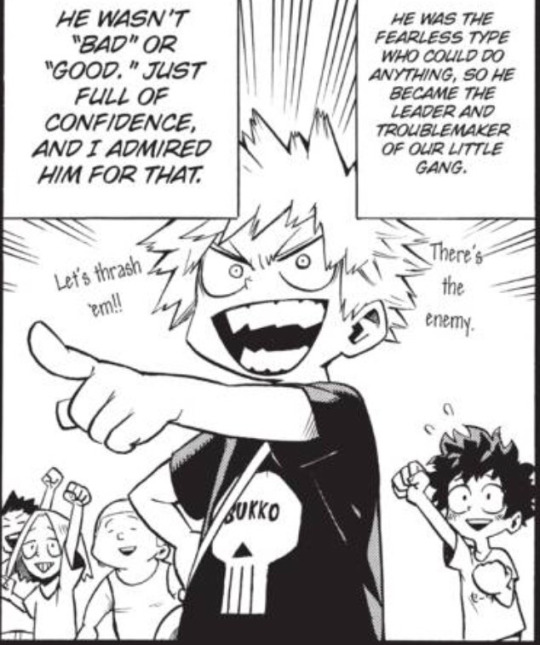
This mentality seems to be working fine for him until Izuku's very presence starts to throw a wrench into everything Katsuki has been raised to believe.
Izuku completely defies logic to Katsuki. Izuku does not fit the societal norm and, beyond what others have taught him, Izuku is Katsuki’s only real hint that the world might not be quite what he thinks it is, and that his idea of what it means to be strong may not be a ‘one-size fits all’ defenition.
Izuku is a quirkless kid; weak and generally mild-mannered. He doesn't have any self-confidence and is a big crybaby. Yet, Izuku still believes that he can be strong and become a hero -- when Katsuki has always been told the opposite. Katsuki recognizes that this may be some version of strength he is unaware of, and it raises BIG RED FLAGS in his mind.
Where many of Katsuki's other childhood friends were barely more than acquaintances who he forgot over time, Izuku immediately caught Katsuki's interest and spiked his curiosity. Like everyone else in his life, Izuku praised Katsuki and told him all the things he wanted to hear -- but Izuku was also unique and intelligent. Izuku was the first person who actually seemed like they could stand near Katsuki's level; like they might be actual competition.
Then, Bakugo got his quirk and Izuku is diagnosed as quirkless. The reactions of everyone around him to this news, including Izuku’s own reaction, only go back to telling him what society has told him all along. Strength is everything, and quirks are a part of that desired strength. This is another moment that reaffirms Katsuki's world view. "I won, you lose. I really am the best."
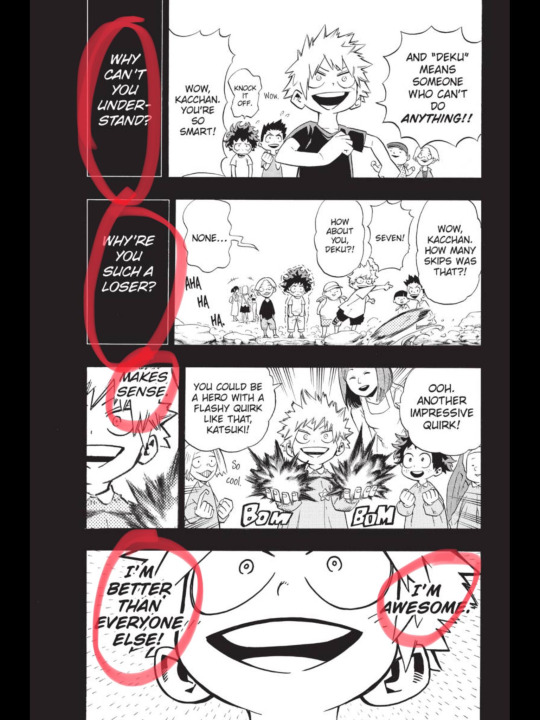
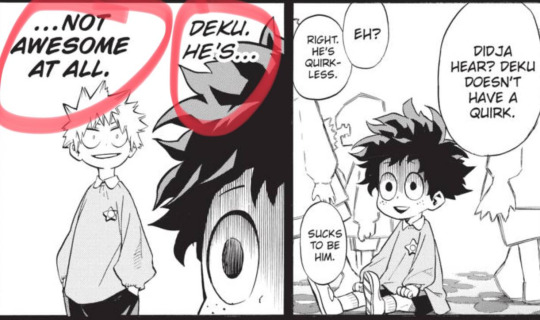
Though Bakugo is super aggressive on the outside, he is a very self-critical character and often means the opposite of whatever he is saying. Especially when it comes to his self-confidence and bravado.
People often complain when watching the series about him telling people to 'die' and "got to hell", or calling other people "extras", and I don't think enough people understand -- that is just how he speaks. Those are things he says out of reflexive anger. None of those words ever have any real meaning.
It's more important to pay more attention to the moments in which he is more reserved/quiet. He suffers from both a superiority complex and inferiority complex, as well as paranoia (much of which revolves around his warped idea of how Deku, and other people he values, perceive him). Much of what he says is just empty words or him trying to project an image of self-confidence.
He wears his pride like a suit of armor to hide all the things he doesn't want to admit about himself. He attempts to make up for his own insecurities by getting angry. And he learned this at home from his mother, who is much the same as him.
From the little that we have seen of his parents throughout the series so far, his parents love him and provide him with everything he could possibly need -- but his mother often insults him and throws harsh truths in his face to counteract his cocky nature. One of the most notable instances of this is when All Might and Aizawa are talking to his parents about moving the kids to the dorms and his mom says "If you hadn't have gotten yourself caught by the villains in the first place, none of this would have happened".
That comment feeds directly into his mental breakdown in front of Izuku where he blames himself for All Might's downfall, flat out saying that "If I hadn't been kidnapped by villains, then it never would have happened".
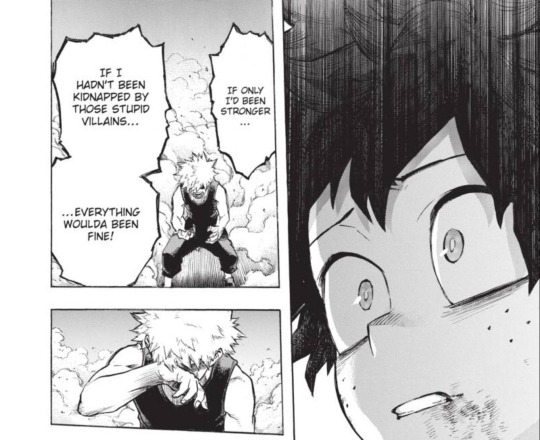
It gets me every time if you go back to the 8th episode of the series, near the VERY BEGINNING -- right after he's defeated by Deku for the first time in combat training -- and the episode literally starts with him having a full on panic attack.
He's trembling, hands shaking, hyperventilating, the whole deal. And that particular incident was triggered not only by Deku defeating him and standing up to him (which completely contradicts the Izuku that Bakugo has grown up with all his life and feeds into Bakugo's own fear that he is weak), but is also brought on by the fact that he notices how severely Deku allowed himself to be injured JUST TO WIN THE EXCERSIZE. Again, this idea that even the weak can be strong. It also doesn’t help that he cares about Izuku and doesn’t want to see him get hurt.
And I'm sorry -- but below does not look like the face of someone who's pissed off to me. He looks PETRIFIED.
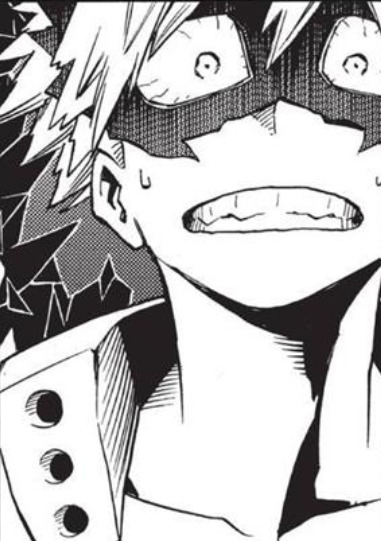
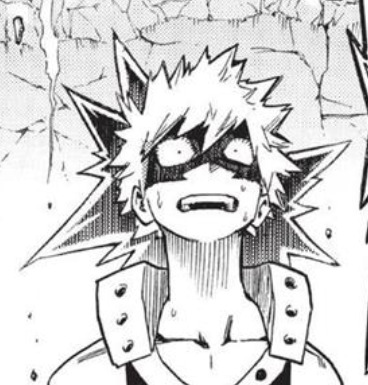
Izuku doesn't just piss Bakugo off -- Izuku TERRIFIES him.
There are actually multiple instances of him reacting like this to Izuku injuring himself throughout the series: sludge villain, sports festival fight against Todoroki and the training camp where Bakugo was kidnapped being the major ones I can think of beyond current managa events. Bakugo may claim to ‘hate’ Deku, but he DOES NOT like to see Deku hurt himself to win, or to save.
Bakugo saw this 'self-sacrificing' trait in Izuku even as a young kid, and it freaked him out. It made him feel weak. It made him question himself and the world around him.
This fear starts with the incident where Bakugo fell off the log as a kid.
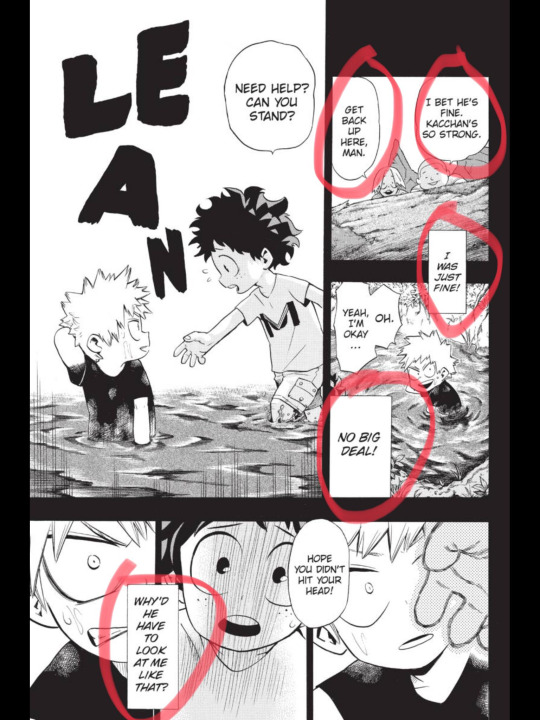
It wasn't a life threatening situation, but it was the first situation where Izuku rushed to Bakugo's aid with complete disregard to himself AND when everyone else refused to help.
Bakugo's friends, teachers and parents all held him to such high expectations of intelligence, power and strength -- so of course those would be the values that he grows up idolizing. No one ever really offered him help, because they assumed he didn't need it -- and then Izuku comes rushing in offering it to him, risking his life to do so, and Katsuki's only thought is "Why?! Why do you feel like you have to save me when you can't even protect yourself? Needing to be saved means that I'm weak! Do you think that I'm weak?" I have recently watched another show that had a similar scenario and that character explained what I believe Katsuki felt in this situation BEAUTIFULLY. ------ “It felt like [he] was trying to say I was weak or something. [He] was intruding on feelings [he] didn’t have any right to – and I hated it. Then that got me thinking about everyone else in my life. They never treated me like I was a weakling; someone who needed his hand held. They had faith that I would continue to grow and they let me do it; helping me without ever making me feel weak.”
Izuku continues to do this again and again throughout the series when it comes to Bakugo: the slime villain incident, the training camp, etc -- all without fully comprehending how his actions affect Bakugo. Each time this happens, Bakugo feels weak and utterly helpless to save himself OR to stop Izuku. It's all his worst fears realized.
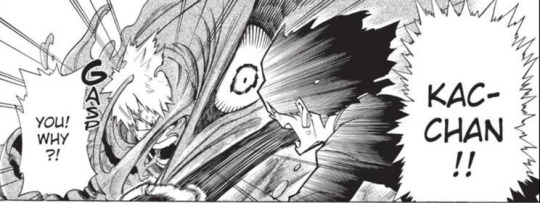
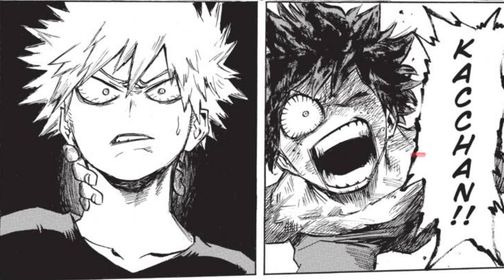
It's like living his worst nightmare over and over without end in sight.
Going back to the concept of him being offered 'help', very few people have offered him this throughout his life -- and they all saw it as something he never really needed. It's like Katsuki's personality and mental state is a huge sign screaming 'I DON'T UNDERSTAND! NOTHING MAKES SENSE! IT MAKES ME MAD AND UPSET! SOMEONE, HELP ME.' and everyone just ignores it.
--- During the log incident - all his friends say 'Oh well, he's fine. He'll pick himself back up.' and Izuku is the only one who offers to help.
--- The sludge villain incident - all the pro heroes say "We can't help right now! You'll just have to hold on, kid!" and again Izuku is the only one who offers help.
--- After his and Deku’s first fight at Ground Beta, which utterly breaks him, all the other students just let him leave alone and only Izuku rushes to help. All Might sees him upset and crying after this and says, “Oh, I guess he’s already over it” -- when that obviously wasn’t the case.
--- And then -- to top it all off -- after he was kidnapped by the LOV and held captive for 3 days without help he wasn't even given time to process! He was taken away by police, ridiculed by his mother, forced to go back to school where his teachers acted like nothing happened, jumped into the provisional hero licensing exam with all those helpless feelings rolling around inside of him and on top of it found out that Izuku received All Might's power -- a power that he had spent his whole life putting on a pedestal. And he goes to Izuku for help.
The fact that everyone just brushed him off like he was someone who didn't need help is just disgusting. The only instance where an adult in his life acknowledged that he needed it was AFTER he already had a full on mental breakdown in front of Izuku, blaming himself for everything that had gone wrong and thinking that he had somehow been living his life wrong all this time. Only then did All Might and Aizawa think, ‘Yeah, maybe we failed this kid.’
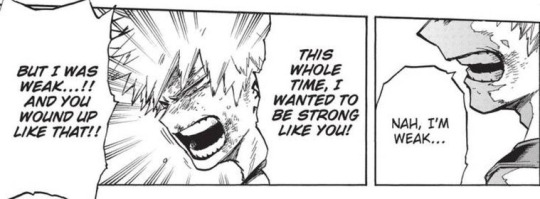
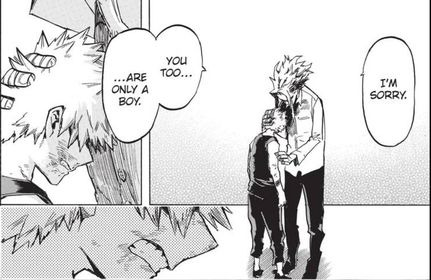
Keep in mind during all of this that he is 15-16-years-old! He's trying to figure out how to deal with this shit all on his own, with the only person he feels comfortable opening up to being Izuku - someone who he has so much trouble understanding.
At the heart of Katsuki is a place of fear. Fear of being weak, fear of being helpless, fear of failure, fear of losing his friends, fear of himself, most certainly fear of Izuku -- and fear FOR IZUKU. He is a boy who lives in a constant state of panic, worry and paranoia. He is lonely and beats down on himself a lot.
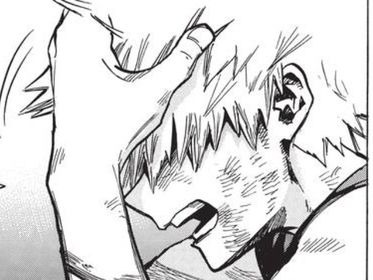
The series deals a lot with how hero society has completely failed it's future generations, but Katsuki is a case where they should have succeeded -- yet ultimately they failed him too. He has all the makings of what could be one of the greatest heroes of all time, yet those around him only focused on the parts of him that could make him great and chose to ignore all the parts that would ruin him from the inside out.
They put him high up on a pedestal only to knock him down and refuse to help him back up. They made him feel like even asking for help was something that made him 'lesser', and it caused him to see other people that way too.
Izuku is the heart of Katsuki's growth, because in every way that Izuku succeeds, Katsuki fails.
I would actually argue that out of anyone in the series since coming to UA, Katsuki has experienced the highest amount of personal failure. He has been knocked down time and time again but ultimately wants to pick himself back up to prove that he deserves to be there. He fights for his friends and tries his best at everything he does. He doesn't always get it right, and he says things that might offend others, but other than Izuku, he's the most driven person there and would utterly destroy himself to reach his goals.
#bakugou katsuki#midoriya izuku#mha#my hero academia#meta analysis#kacchan#deku#bakudeku#katsudeku#bkdk
464 notes
·
View notes
Text
Day One: Paranoia
Masterpost -- Day Two
Continued from: Anomaly Something wasn’t right. Nothing had changed significantly since the last time he’d been to the headquarters. People were still chatting amicably with each other but…the atmosphere of the office was off. And nobody was noticing.
Which was alarming, considering the entirety of the workforce were psychic.
Not for the first time, Endovelicus was glad for the mask he wore. Even if someone could stand to look at his face, they would’ve seen the tension in his jaw as he tried to spot just what it was that he was sensing.
Normally he’d chalk the feeling down to his own unruly thoughts. It wouldn’t have been the first time that his own imagination had run away from him in a bad way, particularly when Endo was tired or had been hurt. Except, he was fully awake and moderately healthy. And his instincts were telling--no, shouting at him that something was amiss.
The snapping of fingers pulled his attention to the here and now. A blonde man with sunglasses tangled up in his wavy hair waved once Endo’s mask turned in his direction. “Wow you’re really not here right now, huh?” Agent October--also known by his office nickname of California--cracked an only slightly nervous grin as he (ill-advisedly) leaned back in his rolling chair.
Once upon a time, the only expression on a person’s face when they looked at him would have been fear. That was before a certain someone took him in and decided to trust him. That she hadn’t called yet despite him running off on a mission of his own choosing was only adding fuel to his already hyper aware senses. Endovelicus could sense her in her office just out of sight, and yet...there had been nothing. Except this odd feeling.
He tapped his fingers across the back of his gloved hand, making sure that the bracelet with a stylized sun was still around his wrist. “I’m as here as I ever am.” Came the deep rumble of his reply.
California rolled his eyes. “Okay and the not vague bullshit answer…?”
Endo didn’t reply for long enough that under normal circumstances, the other man would’ve filled the silence with his own inane chatter. When it didn’t happen, even after a solid minute and a half of waiting, there was nothing else for it. “Something’s weird.”
“I just said--”
Without even bothering to ask or warn him, Endo telepathically dug around in California’s head for a good metaphor. After a quick moment (and a yelp of surprise from the other man), he found one that he liked best. “It’s like headquarters is a puzzle and someone took two very similar looking pieces and put them in the wrong places.”
The agent held his head like he suddenly developed a migraine. “Fucking--did you need to do that?? My mental walls don’t need more damage.”
“Yes.” Endo felt himself grin, despite how uneasy he still felt.
“Fuck you, fuck your insane powers, and fuck your bullshit answers.” California rubbed at his temples with his eyes tightly shut. “I’ll snitch on you to June after we deal with whatever’s bothering you.”
He didn’t even need to read the man’s mind to know that the threat was an empty one. “Fine.”
Taking his sunglasses out of his hair to place on the bridge of his nose, California finally had a moment to properly sort out what the metaphor had been. “Like a puzzle but with a couple pieces flipped, huh…how come no one else can sense it, though?” He was able to look around just fine, but no one else did the same in their direction. Luck had nothing to do with it. Endovelicus was already quite infamous around the Psychic Assistance Organization. The fact that he had engaged in massive breaches of ethics and etiquette with one of the two people who he listened to meant that no one else was going through the same thing. Or so the other agents hoped.
In response to the question, Endo shrugged. “It’s too high level for them, maybe? People got drugged? Shit’s just weird, and I can’t pinpoint it.”
There was another moment of silence while both men scanned the room. “Too high for me, though?” The agent said in a much quieter tone than his usual one. “I’m not like, a master telepath but I’m not sure if--” He winced as Endo not-so-gently opened up a mental link. “O-kay, yeah, that’s…” Through the link, he could feel and hear California’s reaction as he spoke. His head was pounding with the new sensation and his emotions went from tempered skepticism to alarm instantly. “That’s not good.”
One advantage to having a telepathic link was that neither party could even try to lie to each other. This was also a disadvantage. Endo let his triumph and satisfaction take the forefront of his thoughts, if only to attempt to hide how much worry he had about what he was sensing. “No, it’s not.”
“Think we need to see how hot or cold the sensation is, or…?”
“I’ve been trying.” Frustration mixed with worried anger filled the link between them before Endovelicus cut it off just as easily as he had established it. “It’s just all over.”
Rubbing his fingers against his temples again, California hummed. “Guess we better talk to June, then.” When Endo didn’t reply after about thirty seconds, he continued, “Well okay first you’d better get yelled at by her and then we’d better talk to her.”
“She hasn’t called.” He barely breathed as he said it.
While his eyes were covered by sunglasses, the agent definitely blinked several times. “You’re gonna have to repeat that, I didn’t hear it.”
Barely increasing the volume of his voice, Endo repeated, “She. Hasn’t. Called. Since before I left.”
California lowered his glasses to look over the rims at the masked man. “You’re kidding. She’s more on the ball about keeping an eye on you than even the people above her.”
“Why the fuck would I lie about that?”
“How should I--” The words died in his throat as the door to the largest office opened. June Summers, Director of this particular branch of PAO, exited quickly and locked the door behind her. She didn’t even spare a glance around her as she headed out through the exit. “Oof, maybe you’re more in the doghouse than ever, man. Gonna have to come up with a really good gift to get back in her good graces.” California had a grin on his face, but it died when he laid eyes on Endovelicus. The masked man was frozen in place, statuesque except for the very slight rise and fall of his chest as he breathed. “What’s up now?”
The deathly white mask slowly turned to look him dead in the eye. Endo spoke slowly and with deadly seriousness. “That woman is not June Summers.”
With a gulp, California managed to ask, “Well then...who is she? And what’s she doing impersonating our director?”
Endovelicus stomped after her, his gloved hands curling into fists. “I’m about to find out.”
#writing challenge#day 1#sparrow writing#original fiction#prompt: paranoia#writing challenge 2021#endovelicus#PAO#rp shenanigans#I may have written him out of character#but to be fair uh#i wrote the previous chapter back in 2017#plus he wasn't a character i controlled at the time#soooo some details are def not remembered#late as hell on the first day but hey it's here#one down thirty to go#next prompt: new
6 notes
·
View notes
Note
HELLOOOOO i love the recent kin assign u did so can i get one as well? if not thats obviously fine too. UMM SOME THINGS AB ME im an entp, and 7w8. i love anything to do w art and psychology, i tend to overanalyze things a lot but my analyzations tend to be right- its mostly my paranoia fueling my need to analyze. im super extroverted and daring, im blunt and realistic i like to look at everything from a realistic angle but still hope for the best or work towards it so i guess u could say im a realistic optimist! i love discussing and debating certain topics and seeing how people think and the mechanics behind people and their actions. 99% of what i say are practically jokes and most of them is dark humor (actually funny kind not the bigoted kind) and i adore cake above all else! most people see me as intimidating and i tend to get angry quite a lot and my way of showing affection is making fun of my friends/lover and showing my appreciation through small details. i adore alt fashion and music, especially the scene kid style ♡
I kin assing you...
Korekiyo Shinguji
First I thought of Korekiyo Shinguji, Korekiyo is an anthropologist so I wouldn't be surprised if he tried to study or observe others or even say things to get a reaction out of them. I'd think Korekiyo would have more of a dark humor to him. Korekiyo also tends to be slightly more blunt, but he's realistic at the same time for the most part. Korekiyo can be kind of intimidating at first. He can also tend to get angry sometimes, especially if it's over something he likes to do personally.
Angie Yonaga
Secondly I thought of Angie Yonaga, Angie loves anything to do with art. She's definitely more extroverted and can be realistic sometimes. She also seems to be more of an optimist though she could easily be trying to hide her fear and anxiety through her extroverted and happy demeanor. I also like to think Angie, like Korekiyo, has more of a dark humor to her. People may see her as intimidating due to how she acts or just find it a little odd in general. I also like to think she'd show affection through making her friends things they like since she's an artist.
Aoi Asahina
Lastly I thought of Aoi Asahina, Aoi is more extroverted than introverted I think, she can also be angered pretty easily if you push the right buttons. She tries to be optimistic for the most part though she can tend to get pretty anxious as well. She'd probably show affection through joking around or just smaller types of things. Though she can probably be clingy as well.
I hope you're satisfied with your results!
#���Mod Kokichi♤#♤Request Complete♤#Kin Matchup#Korekiyo Shinguji#Korekiyo#Angie Yonaga#Angie#Aoi Asahina#Aoi#Danganronpa#Danganronpa Trigger Happy Havoc#Danganronpa Killing Harmony#Dr1#Drv3
3 notes
·
View notes
Text
of flesh and blood 6
start - part [5]
It might be petty, but I don't care It's not pretty, but I'm not scared You might say I'm overreacting - you always try to, always try to. You minimize the hurt you gave me You minimize the pain that plagues me Oh, your demise is around the corner No compromise, I'm taking over now
-
“Ah, you are awake. I would say I was worried, but I tested out that emotion, and frankly was unimpressed.” Gavin stirred with a sleepy grunt that escaped through his teeth, squinting through blurry, swirling vision as he vaguely made out the form of the RK900’s tall figure and the black and white jacket it wore. There was a moment when he saw blue blood staining the front, but the sight was gone in a flash, signaling him that it was a hallucination and nothing else.
“What the…ah, damn,” he murmured as all of the pain from the event prior flooded him at once, an immediate headache followed by the burns of the tiny lacerations from shattered glass and hot metal when he’d collided with the lamp and an entire piece of wooden furniture. His cheek still stung from being smacked down to the table, and his voice was hoarse when he tried to speak as he had a sore throat, as if he were getting sick -- but he knew better.
The way the android was so easily able to manipulate him and bend him beneath its physical prowess had terrified him to the point he was silenced.
“Guilt is equally disturbing in its nature. Why would you have the desire to take back something you did of your own accord? Point-defeating. Humiliating, really, but that’s a different can of worms I haven’t explored yet and I’m quite alright leaving on the metaphorical shelf.” It obviously ignored Gavin muttering to himself, leaving him to eventually fall quiet in his own disorientation.
“Anyway.” Eyes wider than usual, Gavin looked frightened, a new, but somehow conventional look for the android to see.
“I don’t think you would learn your lesson simply from a beating, even if you think it works to physically abuse others, so I will say this now: Things are going to change, and you will learn that being loud, boisterous and aggressive is not going to work in achieving your way.”
Gavin couldn’t tell if he was struck frozen with anger, fear, or the wretched combination of both, a weight sinking into his gut as he felt the need to run. When did he wind up on the couch, and how long was he unconscious for?
“Two hours and forty-three minutes.” Gavin blinked away the paranoia that the RK900 had somehow read his mind.
“Not bad, but not terribly great for an athletically fit military child in his mid-thirties.” Gavin felt his breath catch in his throat, face contorting to its usual snarling glare as he seemed to merge back into his animated personality again. In the goal to get a rise out of him and equally gaining the desired result, the android smiled to itself with synthetic confidence as it saw the familiar gleam in his eyes, his jaws clenched in anger while he tensed every muscle in his body. Statistically, Gavin wore himself out in short, sudden bursts, leaving him weaker in the long run. With the constant activity of his insomniac mind continuously grating away at his emotional temperament and his ability to think and concentrate, it created an endless cycle of someone that was always angry at his own unsolvable problems. An unhealthy mindset and equally inhabitable lifestyle created a pattern that would never end if Gavin didn’t make the decision to change the behavior in himself.
Or if something else influenced him to do so.
“You aren’t saying anything.” As if proving its point, he grits his teeth in the inability to speak, lest he somehow say the wrong thing. The android’s influence was already evident.
“What’s the matter? Android got your tongue?” As it forward until its face was hovering above his own, Gavin immediately snapped upright from the couch and stood up with a sudden flood of adrenaline fueling his attempt to run from the android.
“Ah-ah-ah.” Gavin found himself on the ground faster than he could acknowledge the fact as the 900 stuck a leg out to trip him, already scrambling on his hands and knees to get to his feet again, eyes set on the front door.
“You see it is not so fun when you are the target. Yes?” As if snapping to attention, he’d turned to face the android and stop his attempted escape, eyes focused while his body stiffened in his own posture of readiness to fight.
“Respond to me, Detective Reed.”
“Fuck. You.” There was a twitch in its eyebrows and its LED rotated yellow for the first time that night as it processed and stored away new data. Gavin’s eyes were immediately on the bright gold ring, something of a twisted halo in his disoriented mind.
“That’s better. Where do you think you’re going?”
“The hell away from you,” he murmured as his ego deflated and confidence nigh on palpably left him, surrendering to the realization he wouldn’t be able to flee, no matter how hard he might try. There was no way he could outrun an android – at least not this one.
“We should work on the blatant lying. It doesn’t suit you.” Seething, Gavin felt his shoulders tense with a familiar ache as he finally responded.
“You can’t do this. You can’t get away with this bullshit, Nines. You won’t be able to. It’s humans over androids.” How was he supposed to say let me go?
“Your vocabulary is definitely on the level of double negatives, and that’s no way to try and prove yourself as intelligent, let alone superior.” His father’s voice echoed in his head from a dark chamber he’d earlier thoroughly believed he’d locked away. There was no longer any reason to fight back when he knew he was overpowered.
RK900 had found exactly what it was looking for.
-
“I think you’ll like this part of training, as you already know it well. Automatic responses from certain sights, sounds, or other of the various human senses are an easy tool to use to build an inherently obedient relationship.”
Eyebrows raising, Gavin felt the familiar irritation at the words that seemed to hit his ears all at once.
“I’m not a dog, and you won’t get away with treating me like one.” 900 feigned a mocking laugh.
“In all seriousness, would you like something to eat? A quick analysis tells me your body’s natural chemical release processes are heavily disrupted, you’re dehydrated and you should get some rest to restore what you can.” He wasn’t even entirely sure what this thing was saying, just that he was tired of hearing it speak.
“What, you gonna order me some takeout?” The android’s expression remained deadpan as it stared at him, still as a statue. Gavin wondered if there was a glowing shimmer to its eyes in the dimmer lighting, or if it was his imagination.
“Certainly. You could say Cyberlife has the pocket change.” Gavin’s gut contorted as he heard the familiar trademark name, now suddenly holding so much more weight with the position he was in.
“What would you like?”
Gavin couldn’t believe this.
“I’ll order a pizza myself, with my own bank account, thanks.”
“Ah yes, 3344-0898-2754. 603. The balance holds a meager amount of $13.42. Your pin is your birth date, 1007. Don’t bother; I have it covered.” Gavin’s jaw hung agape in disbelief for a moment, the agitation of being so heavily undermined stirring his internal loathing, but the fear of such deep privacy invasion kept him from reacting the way he typically would, without a single fucking word that would leave his mouth.
“What are you going to do?”
“Get you to stop asking stupid questions, first of all.”
4 notes
·
View notes
Text
The Magician’s Mania
“Do it. You can trust me. There will be no pain in it. Look at all I’ve done for you already,” The voice Marvin listened to that fateful day cooed.
It was only two months ago when it all began. Marvin was sitting on a sidewalk after abandoning a futile chow. He knew his acts were amateur and unoriginal. He had been canned many times before, so this time Marvin left before he received his censure from his employer.
Marvin started crying at this point. He had dedicated his life to this. He had nothing left to go to. Didn’t they teach him to follow his dreams and be happy? Why didn’t it work for him? After his tears were exhausted, Marvin shambled into the nearest bar. He had no money to get a drink, but at least it was warm and out of the rain that erupted during his sobbing. He did his best to look like he had a reason for being in the bar to avoid being kicked out. Hours passed while Marvin entertained himself by playing several rounds of solitaire with a deck he always kept on him.
As midnight turned to one then two in the morning, the mood in the bar began to die. The building felt completely empty. Even the bartender was out of sight. Marvin glanced around to see if he was the only person left. That’s when he saw him. A colorless man seated on the other side of the bar was staring right back at Marvin. He quickly looked away. “He’s just some random drunkard,” Marvin thought to himself. His rationalizing was ineffective in comforting him, and the man was too well dressed to be a common drunk.
Marvin made the bold move of retuning hid gaze to the man. He was still watching Marvin, and he could feel himself begin to sweat with paranoia. He needed to go, now. With one last glimpse at the man, Marvin exited the bar, the man’s eyes following him out.
Once out of the bar, Marvin made his way to his shack of a house. It wasn’t much, but as they say, it was home. Hanging on the door was another eviction notice. Of course, what else could go wrong today? What more can this world take? Ignoring the notice, Marvin walked into the chilly one room house. He reached for the light dangling in the center of the room. The moment the light turned on, Marvin could see the man standing only inches away from his face. The shock caused Marvin to fall back to the ground.
“W-wha-,” Marvin stuttered before being interrupted by the man.
“Magic is a tricky business, isn’t it?” the bleak being said plainly. “You either rise to the top, or you fade away at the bottom.”
“Who are you?” Marvin asked, rising to his feet.
“Of course, illusions have become quite popular these days, but if you truly want to make it big, you need the real stuff,” the figure continued without acknowledging the question.
“Hey! I asked you a question! Who the hell are you?!”
“So, you do have some backbone. I was beginning to worry you just a little pansy. Magic requires a strong soul to wield it.”
“What the hell are you talking about?! And again, who are you?!” Marvin shouted as his anger and frustration overcame his fear.
“Yes of course, let’s see. You may call me Dark. Yes, that name will work. Now, I have a question for you. How badly do you want to become a world-class magician?”
Marvin’s questions were reduced to one. How did he know? Rather that ask, Marvin simply answered the question he was asked.
“I’ve spent my entire life pursuing this dream. I guess you could say I’ll do anything.”
“Good. Then the first step is getting you out of this hovel and onto a proper stage.”
Without a moment’s warning, Marvin was backstage. He could hear the muffled sound of an applause from an audience. Where was he? He was dressed in an elaborate tuxedo much fancier than he could ever afford. While Marvin was busy inspecting this new world, Dark approached him with a cartoonish cat mask in his hand.
“And what would a magician be without his signature look?” Dark asked as he handed Marvin the mask.
“Is this really necessary? It looks ridiculous,” Marvin protested.
“You’ll wear it is you want to be a success. Now, you’re needed on stage. Your audience awaits you.”
Marvin had no time to object before Dark threw him out of the curtains. With his back to the audience, Marvin could hear the cheers grow once again. The sound of approval sparked a new motivation within Marvin’s heart. Large grin plastered on his face, he put on the mask and spun around with enthusiasm.
He didn’t know what he was supposed to do, so he did his best to improvise. In order to stall for an idea, Marvin introduced himself to the spectators, but he somehow managed to summon massive pillars of flame from his hands instead. Gasps filled the room in awe and amazement. The spectacle was short lived, and Marvin could hear Dark cackling from back stage. Marvin finally realized what he was now able to do.
New potential at his fingertips, Marvin was able to execute the most thrilling acts anyone had seen. He was able to vanish without the assistance of mirrors or gimmicks. He made a man completely fall asleep, and the crowd adored him with thunderous praises. At the end of the performance, Marvin was extoled with a standing ovation and a storm of an applause. Then, everything slowed and grew quiet.
“This is nice, isn’t it? You’ve finally had a taste of success,” Dark’s voice echoed in Marvin’s head. “Take the mask, if you’d like. You can pay me back later.”
Distracted by his adulation, Marvin only heard half of what was said. “This is what if I’ve worked so hard to achieve. Look at me now,” he thought as he smiled back at the audience and bowed. “And, it only gets better form here.”
As it turned out, Marvin was correct. He went on the perform in Las Vegas, Paris, Cornwall, and Toronto. He starred in magazines, on television, and in newspapers. Everyone on Earth seemed to know the name Marvin the Magnificent. Not only was he famous, he was wealthy. Bathing in money, he owned estates across the globe. The memory of the mad man at the bar had faded from his mind under his joy for success.
One night, after an excessive amount of spending, Marvin found himself in a forest. He had no clue when or how he got there. It was as if he had fallen asleep and entered some kind of dream. However, this was no dream. The forest wasn’t even that familiar to Marvin; he had never been there before. He began to wander around, in search of some kind of road or exit. At first, He tried to use his magic to fly above the trees or light his path, but nothing worked. His powers were gone.
After what felt like hours, Marvin spotted a flicker of light in the trees ahead. He rushed toward it with a desperation to get out of the damn woods. AS he got closer, he could hear the crackling of a fire. Sure enough, Marvin reached a small opening in the dense trees. In the center was a decently sized flame. However, Marvin noticed that it had nothing to fuel it. Something was off. As Marvin drew closer to the fire, it remained a calm temperature, not too hot, not too cold. He sat down next to it to warm up from the frigid air of the night. Despite being two feet away from an open flame, Marvin was comfortable.
Marvin jolted awake with a shudder. He was still in the forest with the fire next to him. It was still nighttime, and Marvin was unsure just how long he had been asleep. He rose to his feet and looked around to continue his escape. Standing on the other side of the fire was the demon, decorated with blue and red auras. A great sense of relief filled Marvin at the sight of the familiar face.
“It’s you! Wow, it’s been a long time hasn’t it?” Marvin said with a cheerful smile, but the demon said nothing, “Say, do you think you could help me? I’m helplessly lost, and your mask has stopped working.”
“Sure, I can help you, but first, you owe me.”
“Owe you? What for?”
The demon flashed a vile grin, “For the mask, of course! Don’t look so worried about it. I just want you to enter a contract with me. Nothing big.”
“Contract? Like for my soul?” Marvin asked, backing away.
“No, no, no, nothing like that. Trust me. I want you to serve me when I need your help, and I return you get to continue your life of luxury.”
“Okay, what do I do? I guess I do owe you a little.”
“It’s simple,” The devil explained as he snapped his fingers, doubling the size of the ember into a bonfire, “Cast yourself into the fire.”
“Are you insane,” Marvin protested, fear taking hold of him, “I’m not an idiot!”
“Relax, you won’t feel a thing,” the demon replied with ease.
“I need to think about this. Can you give me a day or two?” hesitated Marvin.
“Do it. You can trust me. There will be no pain in it. Look at all I’ve done for you already,” the fiend cooed.
Marvin stared deep into the crimson flames. They seemed welcoming. Impulsively, he jumped into the fire. Nothing, Marvin could feel nothing. Then Dark let out a trivial laugh as the flames returned to their natural function. Marvin’s hair-raising screams of pain were in vain, as the searing heat melted the flesh from his body. He struggled to drag himself out of the inferno but to no avail. After only moments, the anguish ceased.
“One down,” the demon whispered as the blaze subsided to reveal nothing but charred bones, ash, and a cartoonish cat mask.
More: https://archiveofourown.org/users/PerryPurpleFingers
#Marvin the Magnificent#Darkiplier#No Romance#My Writing#Based on a song#Based on a friend's story#sad ending#Major character death#sorry not sorry
4 notes
·
View notes
Link
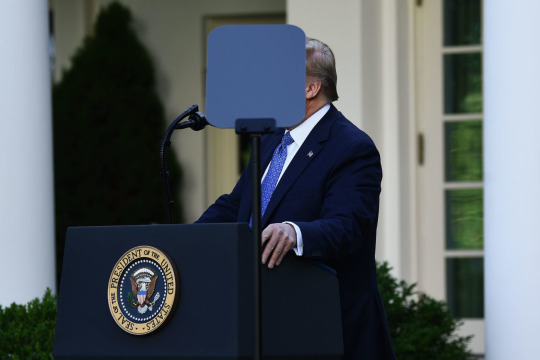
It seems so clear now.
In June 2016—roughly seven weeks before Donald Trump formally received the Republican nomination for president—I wrote an extended essay in the Huffington Post assessing his behaviors. The title was self-explanatory: “ Too Sick to Lead: The Lethal Personality Disorder of Donald Trump.”
By then, Trump had supplied us with overwhelming evidence of an ineradicable pathology which utterly disqualified him for the presidency. But few political observers wanted to touch such a volatile subject.
His party feared him. The media put him in their customary analytical boxes, parsing his every move as if he were something grander, yet more normal, than a mentally disordered demagogue bereft of principles and starved for adulation. And those mental health professionals who dared address the obvious were chided by their peers for psychoanalyzing a man they had never met.
But we had met him—ceaselessly, for decades, and never more than in the year before June 2016, when cable news frequently broadcast his appearances in their entirety. His character disorder was klieg-lit; central to Trump’s pathology was his uncontrollable need to flaunt it.
Most remarkable about his psychological illness is the utter consistency of his behaviors. My descriptions of his pathology, and how it would operate in office, are as applicable today as they were four years ago. Save for factual references specific to 2016, I need not change a word. This owes nothing to my special insight, and everything to Trump’s inability to be anything other than what he was and always will be: a man far too disturbed to occupy the White House.
That he does underscores the core issue in 2020: Will a critical swath of voters, despite all we’ve learned about his unfitness for the presidency, return this man to power?
No longer can we rationalize away his disabling instability—not for tax cuts, or judges, or ideology writ large. By deliberately averting their eyes from the incessant manifestations of his feral inner landscape, the GOP and much of the news media became complicit in his Electoral College victory—and the damage he has inflicted on our democracy and society.
To capture Trump’s singular abnormality, I opened my June 2016 article by describing a telling example from his past: his disturbingly bizarre and infantile practice of pretending to be someone else while calling a reporter to brag about his own romantic life. After describing an audiotape of Trump’s pseudonymous 1991 phone call to People magazine boasting about his supposed romantic involvement with several ultra-famous women—made despite the fact that he was living with his future wife Marla Maples—I pointed out that this behavior was not merely “self-aggrandizing” but also “gratuitously cruel, heedless of all but self, reckless in his lust for attention” and, therefore, that it reflected on Trump’s “psychological fitness to be president.”
With this indubitably aberrant practice as preface, I argued that there is “only one organizing principle” that can make sense of Trump’s “wildly oscillating utterances and behavior—the clinical definition of narcissistic personality disorder.”
The Mayo Clinic describes it as “a mental disorder in which people have an inflated sense of their own importance, a deep need for admiration and a lack of empathy for others.” This is bad enough in selecting a spouse or a friend. But when applied to a prospective president, the symptoms are disqualifying.
With Trump ever in mind, try these. An exaggerated sense of self-importance. An unwarranted belief in your own superiority. A preoccupation with fantasies of your own success, power and brilliance. A craving for constant admiration. A consuming sense of entitlement. An expectation of special favors and unquestioning compliance.
A penchant for exploiting or disparaging others. A total inability to recognize the needs of anyone else. An incapacity to see those you meet as separate human beings. An unreasoning fury at people you perceive as thwarting your wishes or desires. A tendency to act on impulse. A superficial charm deployed to disguise a gift for manipulation.
A need to always be right. A refusal to acknowledge error. An inability to tolerate criticism or critics. A compulsion to conform your ever—shifting sense of “reality” to satisfy your inner requirements. A tendency to lie so frequently and routinely that objective truth loses all meaning.
A belief that you are above the rules. An array of inconsistent statements and behaviors driven by your needs in the moment. An inability to assess the consequences of your actions in new or complex situations. In sum, a total incapacity to separate the world from your own psychodrama.
Recognize anyone? . . .
The annals of business are filled with such people, some of whom wind up in jail, others of whom die rich. But however puissant they become in their chosen realm, their sickness of mind and spirit cannot ruin a country. That power is reserved for presidents.
Indeed, Trump’s rise simply swells his unwarranted belief that he can stride the world like a colossus—naked of judgment, knowledge, temperament or preparation. This reflects a fatal deficit in those who suffer this disorder—they cannot see themselves as they are.
To the contrary, their grandiosity is a defense against feelings of inadequacy too deep and painful to acknowledge. By the consensus of mental health experts, this emotional impairment has a last fatal ingredient—there is no cure. For a man like Donald Trump, life offers no lessons, no path forward save to continue as you have until, like Icarus, you fly too close to the sun.
This disability involves far more than a set of discrete character flaws, however grave, including those which suggest a lack of trustworthiness. We survived the dishonesty and paranoia of Richard Nixon, after all, albeit at considerable cost and only after forcing him from office.
But in many ways Nixon was well-equipped for the presidency, capable of navigating the larger world and understanding complex situations and people—as in China and its leaders. He did not reflexively substitute a grossly inflated sense of self for knowledge, strategy or preparation. His tragedy, and ours, was that his crippling inner wounds outstripped his proven strengths.
Donald Trump is altogether different—and infinitely more dangerous. He is afflicted with a comprehensive and profound character disorder which leaves no corner of his psyche whole. And this dictates—and explains—every aspect of his behavior.
Take his recourse to bullying and slander. “I’m a counterpuncher,” he rationalizes. “[I]’ve been responding to what they did to me.” Now we understand, Donald—your enemies made you do it.
Really? So Heidi Cruz made him ridicule her looks on Twitter? That handicapped reporter made him imitate his disabilities at a rally? . . . And on and on—the list of enemies he must demean is infinite.
A recent example typifies his psychological imbalance. Speaking at a rally in San Diego, he tried to shame an otherwise obscure federal judge in the city, who is presiding over a lawsuit against Trump University. Trump called the Indiana-born judge a “Mexican,” a “hater of Donald Trump” and a “very hostile person” who had “railroaded” him. Heedless of his position or his audience, Trump wallowed in his personal grievances so long that his listeners grew restive. And so, yet again, the campaign for president descended into the poisonous murk of Trump’s inner world.
This astoundingly graceless and unpresidential behavior is far too pointless and indiscriminate to qualify as strategy or tactics. The common thread in all this lashing out—often at those who can’t fight back—is that it has nothing to do with issues, or anything else one would expect from a normal candidate. It is another symptom of Trump’s pathology—the visceral reflex to humiliate and degrade anyone who displeases him, no matter the context or situation.
Take the media. Where, one might ask, would Trump be without its constant and credulous attentions? But, like everyone else, the media can never do enough to feed his needs. He threatens the owners of newspapers with reprisals by the federal government, talks of changing libel laws to facilitate lawsuits for statements which affront him, proposes revoking FCC licenses for media which ruffle him. CNN is “very unprofessional”; like so many others, Fox has treated him “very unfairly.”
He refers to the media which cover him as “scum.” He singles out by name reporters who dare to challenge him. . . . After all, Trump says, he’s “fighting for survival”—ever victimized by hostile forces who fail to recognize his innate superiority.
Opposition of any kind enrages him. He incites reprisals against protesters. He threatened violence in Cleveland as payback for the GOP’s “unfairness.” He fuels anger against Hispanics, Muslims, and other minorities whom he perceives as inimical. And never—not once—does he take any responsibility for stirring these toxic pots. For one of the symptoms of his disability is an absence of conscience or accountability.
So what did women do to him, one wonders? The offense was obviously grave, for his misogyny is endless and, it seems, uncontrollable. One can but identify the same symptoms which drive his comprehensive impulse to demean—the need to dominate, displeasure at feeling thwarted and, of course, a profound lack of empathy for anyone but himself.
But for “Trump,” ever beset, his empathy is boundless. His view of others vacillates wildly based solely on their deference—or lack of it. . . .
Which brings us to a central problem of Trump’s warped psychology—he believes that filling the presidency requires nothing but the wonder of himself. This gives the lie to GOP’s most craven rationalization of its own capitulation: that a suddenly docile Trump will, as president, defer to a cadre of wise and experienced advisers drawn from the party establishment.
This is pernicious nonsense. Consistent with his character disorder, Trump proudly insists that his chief adviser is himself. Even were he so inclined, in order to learn from others he must know enough to discern good advice from bad. But such is his pathology that he feels no need to learn much of anything from anyone. And so, from the beginning, he has plunged us down the bottomless rabbit hole of his intellectual emptiness.
His ignorance and grandiosity form a lethal compound. He disowns NATO, unaware that he is playing into Putin’s hands . . . and imagines negotiating one-on-one with North Korea’s psychotic leader. . . . Oblivious to the appalled reaction around the globe, he promises to compel the respect of world leaders through “the aura of personality.”
His equally spurious domestic “proposals,” such as they may be, reflect nothing but the unreality of his own self-concept. . .
But to talk of Trump in terms of issues is to flatter him. Most of what he says is provisional, ever subject to change, and based on nothing but his needs at the moment. . . .
One can forecast the inevitable day-to-day damage to our country—the lashings out, the abuses of power, the mercurial and confidence-destroying lies and changes of mind, the havoc his distorted lens would wreak upon our institutions and our spirit. But most dangerous of all is the collision between a volatile world, a leader unable to perceive external reality, and the often-unbearable pressures of the presidency. That Trump’s judgment would crack time and again is certain—the only question is how dangerous the moment.
So how have we fallen prey to a man who, by the damning evidence of his own behavior, is psychologically unfit to be president? When did boasting top coherence; mindless posturing become strength; a talent for ridicule supplant experience or judgement; a gift for scapegoating surpass wisdom or generosity? Why must we even contemplate someone with this stunted inner landscape as the world’s most powerful man?
Why, indeed? But that was then—2016. In 2020 America’s electorate has experienced three and a half years of the most aberrant presidency in our history. We have no excuses left.
Our president’s sickness is ever on display. According to the Washington Post, as of May 29 Trump had made more than 19,000 false or misleading claims in a little over 1,200 days in office. During this time, we have witnessed his manipulation of the Justice Department, attacks on the rule of law, refusal to honor congressional subpoenas, fascination with authoritarian leaders, assertions of unlimited power, and attempts to solicit or compel electoral assistance from foreign governments.
Hungry for attention, he subjects us to a constant stream of scurrilous tweets, false accusations, rank divisiveness, unhinged conspiracy theories, blatant racial innuendos, shameless denials of reality, reflexive self-pity, unbounded grandiosity, puerile insults to real or imagined enemies, and claims of superior expertise in a multitude of areas where his abysmal ignorance is manifest. His sole concern is for himself.
This confluence of anti-social behaviors would be shocking in a relative or coworker; in a president, they are frightening and disorienting. Since his inauguration, Trump has debased the coinage of the presidency, eroded the boundaries on presidential misconduct, and poisoned the well of civic decency. His crippling dysfunction is now ours.
These behaviors have caused an increasing number of mental health professional to issue warnings about Trump’s psychological condition. In 2017, forensic psychiatrist Bandy X. Lee edited a book, The Dangerous Case of Donald Trump, that included essays from dozens of psychiatrists, psychologists, and mental health professionals. And last December, two weeks before Trump’s impeachment, Dr. Lee submitted to Congress a petition, with 650 other psychiatrists, psychologists, and mental health professionals as co-signatories, which included this disturbing admonition:
What makes Donald Trump so dangerous is the brittleness of his sense of worth. Any slight or criticism is experienced as a humiliation and degradation. To cope with the resultant hollow and empty feeling, he reacts with what is referred to as narcissistic rage. He is unable to take responsibility for any error, mistake, or failing. His default in that situation is to blame others and to attack the perceived source of his humiliation. These attacks of narcissistic rage can be brutal and destructive.”
Further, Lee explained to the London Independent, Trump was “doubling and . . . tripling down on his delusions”; “ramping up his conspiracy theories”; and “showing a great deal of cruelty and vindictiveness” in his “accelerated, repetitive tweets.”
Recent examples include his vicious allegations that, twenty years ago, Joe Scarborough murdered a woman who worked in his Florida congressional office. In reality, she died of a heart attack when Scarborough was 500 miles away. But Trump’s cruelty caused her anguished widower to implore Twitter to delete his sadistic tweets.
A related sign of emotional instability is Trump’s obsession with projecting dominance and strength—the underside of which is a debilitating admixture of neediness and insecurity.
Recent examples abound. Some would be seriocomic were he not America’s president:
As reported by Ashley Parker and Josh Dawsey in the Washington Post, Trump sidetracked a cabinet meeting with a lengthy re-enactment of his supposedly stellar performance—three years prior—on a cognitive screening test.
After taking refuge in an underground bunker when protesters ringed the White House, he furiously denied it—claiming to have been conducting a snap inspection tour.
When a videotape captured his halting descent down a ramp after speaking at West Point, Trump delivered a rambling fifteen-minute revisionist history at his rally in Tulsa—blaming, among other things, slippery shoes.
Other examples are alarming, indeed ominous. His constant calls to “dominate” the streets during protests following the death of George Floyd. His threats to deploy active duty troops on American soil. His misuse of military personnel to clear peaceful protesters near Lafayette Square—all so that he could hold a borrowed Bible aloft in front of a damaged church, a videotaped piece of authoritarian theater.
The gnawing hunger of Trump’s misshapen psyche dominates Carl Bernstein’s appalling new account for CNN of the president’s conversations with foreign leaders, detailing in the starkest terms the consequences of investing someone of his pathology with the power of the American presidency.
Writes Bernstein:
Trump was so consistently unprepared for discussion of serious issues, so often outplayed in his conversations with powerful leaders like . . . Vladimir Putin and Turkish president Recep Erdoğan, and so abusive to leaders of America’s principal allies, that the calls helped convince some senior U.S. officials—including his former secretaries of state and defense, two national security advisers and his longest-serving chief of staff—that the president himself posed a danger to the national security of the United States . . . [and] to conclude that the president was often “delusional,” as two sources put it, in his dealings with foreign leaders.
Central to these conversations was Trump’s disabling absorption with himself: “Trump incessantly boasted to his fellow heads of state, including . . . North Korean dictator Kim Jong Un, about his own wealth, genius, ‘great’ accomplishments as president, and the ‘idiocy’ of his Oval Office predecessors. . . . In his phone exchanges with Putin . . . the president talked mostly about himself . . . [while] obsequiously courting Putin’s admiration and approval.” Adds Bernstein: “The common, overwhelming dynamic that characterizes Trump’s conversations with both authoritarian dictators and leaders of the world’s greatest democracies is his consistent assertion of himself as the defining subject and subtext of the calls.”
But for allies, Trump’s manner was the opposite of his pandering to the authoritarians: bullying, abusive, and riven with grievances. “Everything was always personalized,” a source told Bernstein, “with everybody doing terrible things to rip us off—which meant ripping ‘me’—Trump—off.” With females, Trump added a withering misogyny. “His most vicious attacks,” Bernstein relates, “were aimed at women heads of state. In conversations with both [Theresa] May and [Angela] Merkel, the president demeaned and denigrated them in diatribes described as ‘near-sadistic.’”
Other consistent features of these phone calls were Trump’s ignorance and dissociation from reality. “Two sources,” Bernstein reports, “compared many of the president’s conversations with foreign leaders to Trump’s recent press ‘briefings’ on the coronavirus pandemic: free form, fact-deficient stream-of-consciousness ramblings, full of fantasy and off-the-wall pronouncements based on his intuitions, guesswork, the opinions of Fox News TV hosts and social media misinformation.”
Bernstein concludes by quoting a senior official who summarizes the grip of Trump’s personality disorder on his conduct of foreign affairs: “There was no sense of ‘Team America’ or of . . . certain democratic principles and leadership of the free world. . . . The opposite. It was like the United States had disappeared. It was always ‘Just me.’”
But, for now, all else is overshadowed by Trump’s catastrophic mishandling of COVID-19—a case study in the literally lethal consequences of his hydra-headed disorder. This is precisely what I meant when, in 2016, I wrote about the dangerous collision between “volatile world, a leader unable to perceive external reality, and the often – unbearable pressures of the presidency.” Trump need not precipitate a nuclear exchange for his warped psychology to cause tens of thousands of needless American deaths.
It has. Last month disease modelers at Columbia estimated that we would have incurred roughly 36,000 fewer fatalities had Trump initiated social distancing one week earlier, and 54,000 deaths had it started two weeks earlier. Instead, fearful that acknowledging the seriousness of the coronavirus would have adverse political consequences, Trump chose misleading the public over protecting lives.
Inexorably, the deadly pandemic overwhelmed Trump’s self-created alternate reality—in which denying its lethality substituted for action. So he substituted yet another fantasy: that his proactive leadership in fighting the virus had saved countless lives and defeated the pandemic.
Even as the death toll mounted, he urged state governments to reopen the economy—dismissing life-saving public health measures recommended by his own government. COVID-19, he told Sean Hannity, is “fading away.” A week later, we suffered the greatest number of new cases since the pandemic began.
Events in the real world provide a roadmap of Trump’s delusions. The coronavirus spiked in the states that were the swiftest to reopen. The European Union has banned Americans as threats to public health. Contradicting Trump, Anthony Fauci warned Congress that “the virus is not going to disappear,” adding that “we are still in the middle of a serious outbreak.”
No matter to Trump. In his imaginary America, the real problem became that we were testing too much, thereby increasing the count of new cases.
By then, as his pathology dictates, Trump had put blame for the pandemic on China, the World Health Organization, the media, Barack Obama, the intelligence community, and the CDC. And he had discovered the real victim of COVID-19: himself. In Vanity Fair, Gabriel Sherman reported Trump telling a confidant: “This is so unfair to me! Everything was going great. We were cruising to reelection!”
Instead, the pandemic has underscored Trump’s complete indifference to other human beings. And not just the vulnerable, the sick, and the dead. He insisted that West Point graduates return to hear his commencement speech in the middle of a pandemic. He scheduled large indoor rallies in Tulsa and Phoenix, surefire super-spreaders, so that he could bask in adoring crowds.
When public health officials in Charlotte inquired about health measures for the GOP convention, Trump moved it to Jacksonville—simply to ensure himself a jam-packed arena filled with unmasked faces, risk be damned. Over a three-week period of public statements amid the pandemic back in April, the Washington Post reported, Trump spoke for some thirteen hours—of which he spent two hours attacking others, forty-five minutes praising himself and his administration, but just four-and-a-half minutes expressing rote sympathy for coronavirus victims and front-line workers.
Further, the Post related in late May, “The coronavirus pandemic has spawned a whole new genre of Trump’s falsehoods. The category in just a few months has reached 800 claims, with his advocacy for hydroxychloroquine as a possible cure, based on minimal and flimsy evidence, already reaching Bottomless Pinocchio status.” As Trump’s confidant told Sherman: “He lives in his own fucking world.”
In that world, Trump is free from the constraints of constitutional democracy.
To stave off defeat, he and his party are striving to prevent the universal voting by mail necessitated by the pandemic, while groundlessly asserting that the mail-in balloting currently available guarantees massive voter fraud by the Democratic Party. Already, Trump is claiming that the 2020 election “will be, in my opinion, the most corrupt election in the history of our country, and we cannot let this happen.”
This is insane. But an increasingly serious body of opinion anticipates that Trump will try to maintain power by denying the legitimacy of the November election. This captures how completely Trump’s sickness has consumed us—expecting our president to subvert American democracy is becoming our new normal.
The problem of Trump transcends party or ideology, and so does our need to be rid of him. For there is no constitutional guarantee against a president too mentally ill to respect its terms—and a party too craven to stop him.
Until further notice, we have both.
How Has Donald Trump’s Mental State Affected His Presidency?
web #website #copied #to read #highlight #link #news #read #blog #wordpress #post
0 notes
Text
Money Mindset – 3 Steps From Poor To Rich Mindset
Money Mindset – 3 Steps To Shift From Poor To Rich Mindset
It seems the more I learn, the more I realize that if we want to achieve or improve at anything in life, including our financial life, it starts with a mindset shift.
Most docs and other high-income earners that join our Passive Investors Circle tell me that it took a mindset shift to get rid of limiting beliefs, actually a money mindset shift, to motivate them to start focusing on passive income creation.
Recently, I was reminded just how important our mindset is when pertaining to our money beliefs after watching an interview between Robert Kiyosaki (author of Rich Dad Poor Dad and The Cashflow Quadrant) and Garrett Gunderson (author of Killing Sacred Cows).
If you have time to watch the interview, you won’t be sorry:
youtube
The Millionaire
In 1996, my senior year in college, I first read the book, The Millionaire Next Door.
Kiyosaki’s book, Rich Dad Poor Dad, was released shortly after in 1997.
If you’ve read both books then you know that they’re polar opposites of one another.
The Millionaire Next Door, similar to Chris Hogan’s Everyday Millionaires, surveyed thousands of millionaires regarding their success habits.
If I had to use “one word” to sum up the habit the majority of millionaires have it would be “Frugal“.
Related Article: 7 Unexpected Habits Of a Frugal Millionaire
Frugal vs Cheap
Whether you realize it or not, there’s a difference between being frugal vs cheap.
When someone is living frugally, this means that they’re intentional with their money. Because they want to have more, they look to get the most value from the dollars spent.
For instance, if they had to choose between a gas station selling gas for $1.79/gallon vs one at $2.27 a gallon, the choice is clear, the lower price wins every time.
Are Frugal People Cheap?
The short answer is “no.” Frugal people want to save money but also value others where cheap people don’t.
I personally know someone that berates others when it comes to money. He’s the definition of “cheap.”
Not that long ago I walked into our local pizza restaurant where he was seen belittling the person behind the counter because they wouldn’t accept his expired coupon.
Cheap people think that EVERYTHING is overpriced.
The bottom line is that cheap people don’t like to spend money, constantly complain about how much stuff costs, lack honesty and moral principles.
Know any cheap peeps?
What Is A Money Mindset?
A money mindset is your beliefs about how money works in the world. Basically, it’s your attitude about your money situation.
Your money mindset guides you on a daily basis about:
what you can/can’t do with money
how much money you’re entitled to
how much you’ll be able to earn
how much you should spend
the way you use debt
how much you give (practiced gratitude)
your ability to invest
This mindset drives how you make key financial decisions each day which can impact your ability to achieve your goals.
Most successful people will tell you:
“If you change your mindset about money, you’ll tend to make better choices about how to overcome challenges.”
Money Mindset Example
Here’s a perfect example of how having a negative experience with negative feelings growing up can affect your money mindset.
Let’s say you grew up in a household that constantly fought about money and your parents always said things like:
“we can’t afford that“
“that’s too expensive“
As a result, this constant bickering might cause you to subconsciously associate money with anger and conflict.
There’s a good chance that in this household, these same parents may have taught that people with money are evil, materialistic, greedy and selfish people.
Do you see how growing up like this could affect your money mindset and cause you to have a terrible relationship with money?
Scarcity Mindset
The example above is one of the main reasons millions of people are walking around with a scarcity mentality about money that prevents them from getting massive amounts of it.
People with this type of mindset believe that there will NEVER be enough to go around.
They try to cling to everything they have for fear of coming up short. Their thoughts and actions arise from a place of lack.
When resources (money, opportunity, recognition) are perceived to be limited then that allows fear and paranoia to take over.
When you have this type of mentality, all decision-making is based on the false notion that there isn’t anything else coming your way.
Or that there’s no more money out there to be made other than what they make each month.
Do me a favor. Take out your wallet and pull out some cash and place it in front of you.
Now ask that money this question:
“Hey money, yeah you sitting there on the table. Do you care about how much money I make? What? You don’t know anything about me? Well I’ll be…”
Look, money doesn’t care or know anything about you or me. It flows to where it wants to go….mainly to who wants it bad enough and has an abundant mindset.
Abundant Mindset
2 Corinthians 9:8 “And God is able to bless you abundantly, so that in all things at all times, having all that you need, you will abound in every good work.”
Real estate guru Grant Cardone constantly talks about how having an abundant mindset can change your life…in a good way.
His definition of abundance is a very large quantity of something. It means having plenty of the good things of life.
“Overflowing” is his word he likes to use to describe abundance.
He says that the WORSE thing we can do with money is have it in a stagnant place such as a savings/checking account or under your mattress!
“Money has to circulate in order to move and grow and it can’t do that sitting still.” – Grant Cardone
Here’s what Stephen Covey the author of The 7 Habits of Highly Effective People says about the abundance mindset:
“The Abundance Mentality flows out of a deep inner sense of personal worth and security. It is the paradigm that there is plenty out there and enough to spare for everybody. It results in sharing of prestige, of recognition, of profits, of decision making. It opens possibilities, options, alternatives, and creativity.“
Those with an abundance mentality are able to focus on the long-term and realize that just because you don’t have something NOW doesn’t mean you can’t get it later.
(Just because you aren’t a millionaire NOW doesn’t mean you won’t become one later.)
3 Steps To Change Your Money Mindset
1) Forget about the past….let it go
As we discussed earlier, your money mindset more than likely started during childhood.
If you were around parents or relatives that constantly discussed having a “lack” of money, then you more than likely have a negative view of money.
The first step to change your money mindset is taken from a line from one of my all-time favorite movies First Blood.
It’s the scene where Rambo pins Sheriff Will Teasle against a tree and tells him to……”Let it go…”
youtube
For those of you that aren’t quite the violent type, you may resonate better with a popular Disney tune that also teaches you to “Let it go…”
youtube
Either way, letting go of the past is key. These negative statements has helped create a negative belief system about money.
I believe that we’re all born rich. This doesn’t mean we all come from wealthy families, but we all have what it takes in us to make a lot of money.
So no matter where you come from, your past doesn’t define your future.
Let it go….
2) Stop comparing yourself to others
Dave Ramsey many times tells his listeners to stop trying to keep up with the Jones’s because they’re broke too!
I couldn’t agree more.
Studies show that 78% of Americans are living paycheck to paycheck as they don’t have an emergency fund.
Basically, that means almost 8 out of 10 people probably can’t afford their home and car they’re driving.
And don’t get me started on social media. It’s way too easy to get sucked into comparing yourself with others as they flaunt pictures of exotic vacations or new car purchase.
You don’t know the details of the other person’s finances. Yes, they could be enjoying the high-life but it could be fueled with mounds of credit card debt. Thanks, but no thanks. Not all that glitters is gold.
Whenever you find yourself making comparisons to others and notice that you’re lacking, you’re diverting attention away from focusing on your own finances and goals.
3) Become a sponge for knowledge
Proverbs 13:20 states, “Whoever walks with the wise becomes wise, but the companion of fools will suffer harm.”
Another way to look at this is, “If you want to soar with the eagles, you can’t run with the turkeys.”
I don’t think we can get anymore straight-forward advice than that.
If you’re going to be wise, you’ve got to have wise people in your life.
You need people who build you up, not tear you down—those who are wise, not fools.
The people you spend the most time with are going to have an impact on who you become and what you value, so be wise about who you choose to spend your time with.
Final Thoughts
Once you take the above three steps then you’re ready to take action. After step #3, you’ll realize that your old way of thinking about how money works was probably wrong.
I know mine was.
After recently speaking at a dental conference in Florida about building wealth with passive real estate, a dentist approached me with a look of excitement on his face.
He said, “Dr. Jeff, you have no idea how much you’ve opened my mind to other ways to reach my financial goals. Thank you!”
This doc (and others in the room) were still under the impression that the only way to wealth was to work until they had reached their “magic number” and hope that they didn’t outlive their savings.
Now that they know there’s more than one way to skin a cat, it’s started to change their money mindset and make their future much brighter than before.
Are you ready to take the next step to transform your money mindset to prepare for your financial future?
Join the Passive Investors Circle to begin to change your financial situation for good.
The post Money Mindset – 3 Steps From Poor To Rich Mindset appeared first on Debt Free Dr..
from Debt Free Dr. https://ift.tt/2LiiCJT via IFTTT
0 notes